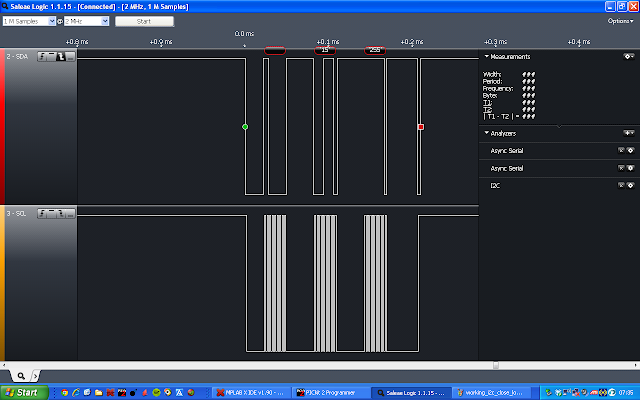I have now managed to configure the PIC to send a message over the I2C bus. It was a bit tricky, but now everything seem to work. Here's the source:
1: //Uart RX/TX loop test and I2C transmission test using PIC12F1822
2: #include <xc.h>
3: //Configuration bits
4: #pragma config WDTE=OFF, PWRTE = OFF, MCLRE=OFF, BOREN=OFF, FCMEN=OFF, CLKOUTEN = OFF, IESO=OFF, FOSC=INTOSC, CPD=OFF, LVP = ON, BORV = 0
5: //This symbol is needed so that __delay_ms() gives a correct delay time
6: #define _XTAL_FREQ 4000000
7: int transmitCycle; //Counter for I2C transmission cycle steps, which are carried out in the interrupt service routine
8: void main()
9: {
10: int transmitCycle = 1;
11: int GPORTA; //Port A ghost variable
12: PORTA = 0x01; //Set RA0 to light LED
13: //I2C baud rate generator set to Fclock = Fosc/(4(SSP1ADD+1)) = 4MHz/(4(2+1))=333kHz
14: SSP1ADD = 0b00000010;
15: //SSP1STAT SSP1 STATUS REGISTER
16: //SSP1STAT = 0b0000 0000; //default
17: //SSP1CON1 SSP1 CONTROL REGISTER 1
18: //I2C Master mode
19: //Serial port pins SDA and SCL enabled
20: SSP1CON1 = 0b00101000;
21: //SSP1CON2 SSP1 CONTROL REGISTER 2
22: //SSP1CON2 = 0b00000000; //default
23: //SSP1CON3 SSP1 CONTROL REGISTER 3
24: //SSP1CON3 = 0b00000000; //default
25: //Set all I/O's to digital
26: ANSELA = 0x00;
27: //ALTERNATE PIN FUNCTION CONTROL REGISTER
28: //Set UART RX/TX to pins RA5/RA4
29: APFCON = 0b10000100;
30: //0 Internal oscillator, 3 <fosc> on, 6-4 4MHz
31: OSCCON = 0b01101000;
32: //Interrupt controller
33: //6 Peripheral interrupt enabled
34: //7 Global interrupt enabled
35: INTCON = 0b11000000;
36: //TRISA
37: //RA1,2,5 set as input, all other IO's set as output
38: TRISA = 0b00100110;
39: //Free running bad rate timer is 7
40: SPBRGH = 0x00;
41: SPBRGL = 0x07;
42: //TXSTA: TRANSMIT STATUS AND CONTROL REGISTER
43: //8-bit transmission, transmit enable, asynchronous mode, high baud rate selected
44: //Baud rate is FOSC/[16 (n+1)] = 4MHz/(16 (7+1)) = 31250, approx 31500 symbols/sec
45: TXSTA = 0b10100110;
46: //RECEIVE STATUS AND CONTROL REGISTER
47: //Serial port enabled, continuous receive enabled
48: RCSTA = 0b10010000;
49: //PERIPHERAL INTERRUPT ENABLE REGISTER
50: //USART Receive interrupt enabled
51: //Synchronous Serial Port (MSSP) Interrupt Enable
52: PIE1 = 0b00101000;
53: //Delay 5 seconds before I2C transmission
54: __delay_ms(5000);
55: SEN = 1;
56: //Loop forever
57: while (1)
58: {
59: //Small routine for blinking RA0 every five seconds
60: //I2C transmission carried out when LED goes off the first time after power on
61: //Blinking continues after I2C transmission, as and indication that controller is running
62: //Read latch A into ghost register
63: GPORTA = LATA;
64: //Toggle bit 0
65: GPORTA = GPORTA^(1 << 0);
66: //Write back into port register
67: PORTA = GPORTA;
68: //Delay five seconds
69: __delay_ms(5000);
70: }
71: }
72: //Interrupt service routine
73: interrupt void isr(void)
74: {
75: extern int transmitCycle;
76: //I2C transmission concists of several interrupt events, variable transmitCycle is used to step through these events
77: //The first interrupt comes with the start condition, SEN, is set.
78: if (SSP1IF)
79: {
80: //Reset SSP interrupt flag
81: SSP1IF = 0;
82: //Send address
83: if (transmitCycle == 1)
84: {
85: SSP1BUF = 0xC0;
86: }
87: //Send first data byte
88: if (transmitCycle == 2)
89: {
90: SSP1BUF = 0x0F;
91: }
92: //Send second data byte
93: if (transmitCycle == 3)
94: {
95: SSP1BUF = 0xFF;
96: }
97: //Send stop condition
98: if (transmitCycle == 4)
99: {
100: PEN = 1;
101: }
102: //Stop is complete, ready to transmit again
103: if (transmitCycle == 5)
104: {
105: transmitCycle = 0;
106: }
107: transmitCycle += 1;
108: }
109: //If USART receive interrupt is triggered, transmit received symbol
110: if (RCIF)
111: {
112: TXREG = RCREG;
113: }
114: return;
115: }
 |
| I2C transmission captured with logic analyzer from Saleae. |
 |
| I2C transmission in close up, to show message translation. |
I need to return the logic analyzer this week, so I need to replace it with something else. I'm thinking about testing out the logic analyzer in the PicKit2.
No comments:
Post a Comment